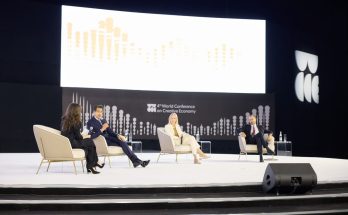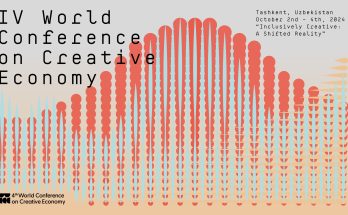India’s Prime Minister Narendra Modi inaugurated the 10th World Hindi Conference in Bhopal on September 10. He spoke about the importance and significance of the language.
Speaking at the event India’s External Affairs Minister Sushma Swaraj said the emphasis this time is more on the possibilities of propagating Hindi in various fields rather than on just literary aspects of the language. She said that this time conference is different from the previously held summits involving literature and litterateurs. “This is a simple conference focussed on Hindi language and to promote Hindi in the country and around the world,” she added.
There are 12 subjects of discussion and recommendations made here would be implemented at the end of the conference. “Earlier the participants were unaware of the topics and findings of the suggestions. Now a detailed report will be published immediately after the discussion so that recommendations can be implemented soon,” said Ms Swaraj.
This time the conference is being held with the intent of promoting the language as a means to employment. The last time the conference was held in India 32 years ago in 1983. In fact the country made a significant contribution at the recent World Sanskrit Conference in Bangkok.
With a sizeable population speaking Hindi in India, many still find it difficult to get employment as English has become the preferred language. The idea is to now change the approach and promote use of Hindi in science and technology, administration, foreign policy, judiciary, and information and technology, among other sectors that would lead to job creation. The ruling Bharatiya Janata Party (BJP) has been a strong advocate of Hindi being the preferred language in India and has a strong support base in the Hindi speaking states. This fact was evident when in the 2014 general elections the BJP-led alliance won 104 seats out of 120 between the two major states of Uttar Pradesh and Bihar.
Speaking about his roots as a tea-seller in Gujarat, Mr Modi spoke about how he learnt Hindi by selling tea to the cattle owners who came from Uttar Pradesh to Gujarat. He said he had to speak in Hindi to run his business. Enthralling the audience, PM Modi said, “Hindi is not my mother tongue, my mother tongue is Gujarati, but I often wonder what would have happened to me if I hadn’t known Hindi. How would have I reached out to the people? How would have I understood them? I am well aware of the strength of language.” Adding some humour to his address, he said, “During a fight or altercation, Gujaratis speak Hindi to suppress the opponent and to influence others.”
Speaking about regional languages, Mr Modi said the focus should be not only on promoting Hindi but other regional languages as well. Comparing the threat of extinction of languages to dinosaurs, he said if we don’t take note of the warnings by the language scholars, these languages would be relegated to history. Calling for steps to be taken to preserve Hindi, the Prime Minister raised concerns that 90 percent of the 6,000 languages spoken world-over face the risk of becoming relics from the past. “If we forget Hindi, it will be a loss to the country,” he warned. If there are no languages, how would literature survive, said Mr Modi.
Stressing on the need to strengthen Hindi, he suggested including notable words from regional languages into Hindi. He said it is the responsibility of every generation to protect the language and if possible conserve the heritage and introduce it to the next generations. “Every state has a treasure trove of languages and if we blend some remarkable words in Hindi as an instrument to connect them, our language will be strengthened,” said PM Modi. Only three languages English, Hindi and Chinese will be influential in the digital world, he added.
Author Profile
- India Writes Network (www.indiawrites.org) is an emerging think tank and a media-publishing company focused on international affairs & the India Story. Centre for Global India Insights is the research arm of India Writes Network. To subscribe to India and the World, write to editor@indiawrites.org. A venture of TGII Media Private Limited, a leading media, publishing and consultancy company, IWN has carved a niche for balanced and exhaustive reporting and analysis of international affairs. Eminent personalities, politicians, diplomats, authors, strategy gurus and news-makers have contributed to India Writes Network, as also “India and the World,” a magazine focused on global affairs.
Latest entries
 DiplomacyJanuary 5, 2026India walks diplomatic tightrope over US operation in Venezuela
DiplomacyJanuary 5, 2026India walks diplomatic tightrope over US operation in Venezuela India and the WorldNovember 26, 2025G20@20: Africa’s Moment – The Once and Future World Order
India and the WorldNovember 26, 2025G20@20: Africa’s Moment – The Once and Future World Order DiplomacyOctober 4, 2025UNGA Resolution 2758 Must Not Be Distorted, One-China Principle Brooks No Challenge
DiplomacyOctober 4, 2025UNGA Resolution 2758 Must Not Be Distorted, One-China Principle Brooks No Challenge India and the WorldJuly 26, 2025MPs, diplomats laud Operation Sindoor, call for national unity to combat Pakistan-sponsored terror
India and the WorldJuly 26, 2025MPs, diplomats laud Operation Sindoor, call for national unity to combat Pakistan-sponsored terror








